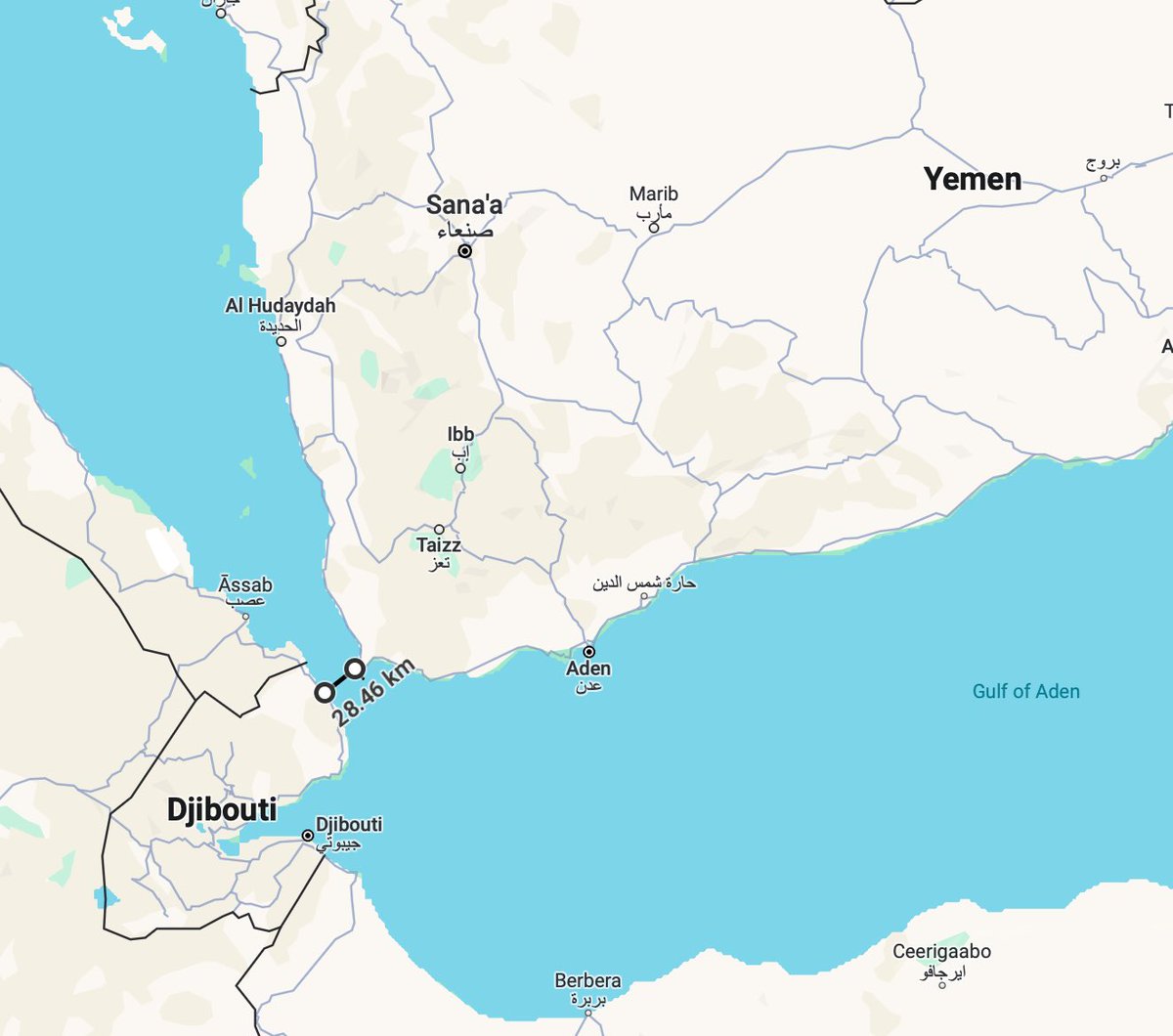On Nov 14th, Yemen announced they would begin targeting Israeli-flagged ships in retaliation for the massacre of Palesitnains in Gaza.
Earlier today, Yemen captured a ship in the Red Sea, an act which may turn out to be the most significant development in the war so far.
Why?🧵
Earlier today, Yemen captured a ship in the Red Sea, an act which may turn out to be the most significant development in the war so far.
Why?🧵

Marine shipping accounts for 80% of the world's trade in goods, and a full 12% of ships pass through the Suez Canal.
The southern end of the Suez is accessed via the Red Sea, which in turn is accessed via the Bab-el-Maneb, a constriction less than 30 km across at its narrowest.



The southern end of the Suez is accessed via the Red Sea, which in turn is accessed via the Bab-el-Maneb, a constriction less than 30 km across at its narrowest.



The ship, a vehicle carrier named ‘Galaxy Leader’, was captured by Yemen’s AnsarAllah in the Red Sea off of Yemen’s coast and has been docked in Yemen’s Al Hudaydah on the west coast. 

Galaxy Leader is partially-owned by Israeli billionaire Rami Abraham Ungar.
Ungar has a long history of quid pro quo with the former chief of Israel's external intelligence agency, Yossi Cohen.




Ungar has a long history of quid pro quo with the former chief of Israel's external intelligence agency, Yossi Cohen.




Ungar also sits on the Board for the INSS, Israel’s most influential think tank, and is well connected to current Minister of Defence, Yoav Gallant. Needless to say, Ungar is a very powerful and well-connected person within Israel.
Thus, this ship was targeted for a reason.


Thus, this ship was targeted for a reason.


Israeli officials are both denying the ship is Israeli while attributing this ship capturing action to “Iran-backed Houthi rebels”.
But the reality is that AnsarAllah, or “Houthi-rebels” as they’re branded by the west, control 70% of the country, including the capital city.


But the reality is that AnsarAllah, or “Houthi-rebels” as they’re branded by the west, control 70% of the country, including the capital city.


Back in April, delegates from the KSA and Oman visited Sana’a and recognized the National Salvation Government, a coalition government led by AnsarAllah, as the de facto government of Yemen.
So far from being an act of “rebels”, the ship was captured by Yemen’s government.
So far from being an act of “rebels”, the ship was captured by Yemen’s government.

While the ship has been captured with dozens of crew aboard, none of the crew are likely to be Israeli nationals, and thus are useless for leverage in negotiations.
So why might Yemen have captured it?
So why might Yemen have captured it?
Two reasons.
Firstly, as a deterrent to future Israel-connected ships from using the Suez, driving up the cost.
And secondly, it forces the US to now make a decision: Respond to this ship capture, or continue pretending as if Oct 7th hasn’t yet escalated into a wider war.
Firstly, as a deterrent to future Israel-connected ships from using the Suez, driving up the cost.
And secondly, it forces the US to now make a decision: Respond to this ship capture, or continue pretending as if Oct 7th hasn’t yet escalated into a wider war.
Option 1: Ignore
The most obvious course of action is to do nothing. But if the US keeps pretending this is solely an Israel/Hamas war, it runs a risk of an insubordinate Israel taking matters into their own hands against Yemen, and rolling the dice on uncontrolled escalation.
The most obvious course of action is to do nothing. But if the US keeps pretending this is solely an Israel/Hamas war, it runs a risk of an insubordinate Israel taking matters into their own hands against Yemen, and rolling the dice on uncontrolled escalation.
Option 2: Force a ceasefire
Despite the lamentations of US politicians, the US unequivocally *does* have leverage to force an immediate ceasefire in Gaza by restricting US weapon shipments, pulling naval support from the Med, and stopping supporting the ground invasion of Gaza.
Despite the lamentations of US politicians, the US unequivocally *does* have leverage to force an immediate ceasefire in Gaza by restricting US weapon shipments, pulling naval support from the Med, and stopping supporting the ground invasion of Gaza.
However, Israel’s current government will not accept a ceasefire and have openly threatened the US and rest of the world with retaliation if such a solution is forced on them.




Option 3: Recruit the Saudis
The US may try to petition the KSA to exert diplomatic pressure on Yemen.
However, as the US loses the ability to exert hegemonic control over the region, Saudis no longer see them as a reliable long-term partners and are unlikely to grant this favor
The US may try to petition the KSA to exert diplomatic pressure on Yemen.
However, as the US loses the ability to exert hegemonic control over the region, Saudis no longer see them as a reliable long-term partners and are unlikely to grant this favor

On the contrary, today the Saudi FM announced their intent to begin building a broad coalition on Monday, with the first stop being China. The purpose of this coalition appears anti-hegemonic to force a ceasefire asap and begin the process of bringing stability to the region.
https://twitter.com/ksamofaen/status/1725907393135964582
Option 4: Retaliate
US naval assets are already positioned in the south end of the Red Sea. Earlier this week, a US naval destroyer was targeted by and shot down a solitary Yemeni drone.
But if US warships remain in the area, or attack Yemen, the next drone will bring friends.
US naval assets are already positioned in the south end of the Red Sea. Earlier this week, a US naval destroyer was targeted by and shot down a solitary Yemeni drone.
But if US warships remain in the area, or attack Yemen, the next drone will bring friends.

Back in August, Yemen’s Deputy FM announced that any US forces approaching Yemen’s territorial waters could trigger the beginning of “the longest and most costly battle in human history”. Based on Yemeni actions since Oct 7th, there’s little reason to think they're bluffing. 

In the midst of unequivocal warnings from Yemen, and Israel's spiraling instability, it’s still unclear which path the US intends to take.
But in failing to set a clear course through stormy waters, one will be chosen by those who have. And right now, Yemen is leading the way.
But in failing to set a clear course through stormy waters, one will be chosen by those who have. And right now, Yemen is leading the way.
The spark ignited by Al-Aqsa flood is now being fueled by the brave people of Yemen. And not only is the light of that fire exposing the US and Israel as the pariah states that they are, it is revealing a truth about the new world: only multilateralism can defeat unilateralism.
• • •
Missing some Tweet in this thread? You can try to
force a refresh
























